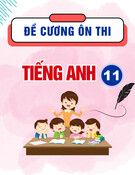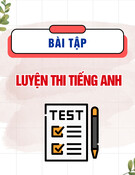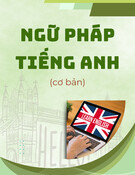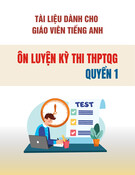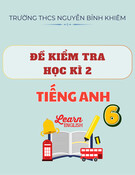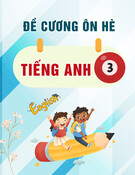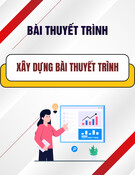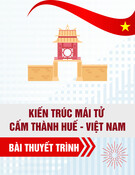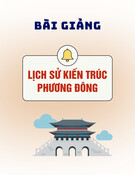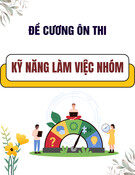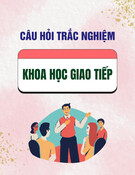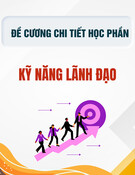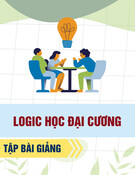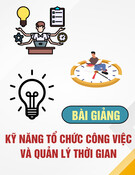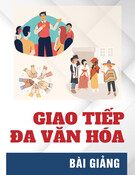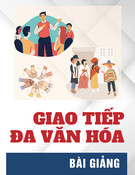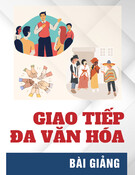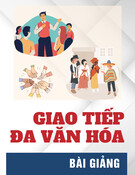REPORTED SPEECH
Ờ TI P)Ế
(L I NÓI GIÁN ự ế ờ 1. L i nói tr c ti p (Direct speech)
ờ ữ ừ ườ ẹ ượ do ng i nói dung đ ượ ặ ạ c l p l i nguyên v n, đ ặ c đ t
ế ặ ấ ự L i nói tr c ti p là chính nh ng t trong d u ngo c kép.
ự ế ượ ờ ế L i nói tr c ti p đ c vi ư t nh sau:
ủ ữ ặ ấ ấ ấ ẩ ộ ậ Dùng d u ph y ho c d u hai ch m sau ch ng và đ ng t ừ ườ t ng thu t.
ế ừ ầ ủ ờ ặ ấ ủ ờ ự ế ấ ố đ u tiên c a l i nói tr c ti p và đ t d u ch m cu i cùng c a l i trích trong
t hoa t Vi ặ ấ d u ngo c kép.
ộ ậ ấ i nói tr c ti p đ c đ t tr c ch ng và đ ng t ừ ườ t ẩ ng thu t thì ta dung d u ph y
ủ ữ ấ ở ố ự ế ấ ờ Khi l ở ố ờ cu i l ự ế ượ ặ ướ i nói tr c ti p thay cho d u ch m cu i câu.
ờ ấ ẫ ỏ ấ ẫ i trích d n là câu h i thì d u h i đ ỏ ượ ặ ở ố ờ c đ t cu i l ặ i trích d n, bên trong d u ngo c
Khi l kép.
ờ ặ ở ẫ ả ấ ấ ấ ố i trích d n là câu c m thán thì d u ch m than đ t ặ cu i câu, bên trong d u ngo c
Khi l kép.
VD:
ế ấ He said, “I am married.” (Anh y đã nói: “Tôi k t hôn.”)
ẩ ậ ấ “Be careful!”, he said. (“Hãy c n th n!”, anh y đã nói.)
CHÚ Ý:
ộ ể ứ ủ ữ ướ ừ ườ t ng thu t là m t danh t thì ch ng có th đ ng tr ặ c ho c
ữ ủ ộ ừ ượ ặ ở ữ ặ ừ ố ủ ế N u ch ng c a đ ng t ộ ứ đ ng sau đ ng t khi chúng đ ậ c đ t gi a ho c cu i câu.
“I’m afraid not”, the man relied./relied the man.
ủ ữ ủ ộ ế ộ ạ ừ ậ ủ ữ ứ ướ ộ ừ N u ch ng c a đ ng t ừ ườ t ng thu t là m t đ i t thì ch ng luôn đ ng tr c đ ng t .
VD: “Nice to meet you”, he said.
ờ ế 2. L i nói gián ti p (Indrect speech)
ờ ậ ờ i nói t ể ườ ng
ườ ữ ậ L i nói gián ti p (l thu t hay k l ế ườ ể ạ i cho ai đó nghe nh ng gì ng ng thu t – reported speech) là cách nói mà ta dùng đ t ặ i khác nói ho c đang nói.
ế ấ ấ VD: He said he was married. (Anh y đã nói anh y đã k t hôn.)
ờ ậ ạ ườ ủ i ý c a ng ng thu t l ờ ườ i t
ậ ờ ờ i nói t i nói. ể ườ ng
ườ ữ ậ ế 2. L i nói gián ti p (indirect/ reported speech) là l L i nói gián ti p (l thu t hay k l ườ ế ể ạ i cho ai đó nghe nh ng gì ng ng thu t – reported speech) là cách nói mà ta dùng đ t ặ i khác nói ho c đang nói.
1
ế ấ ấ VD: He said he was married. (Anh y đã nói anh y đã k t hôn.)
ộ ế ừ ủ ệ ề ở c a m nh đ chính
N u đ ng t ặ ỉ ổ ạ ừ ẫ ờ thì simple present (say), present perfect (have/ has (pronouns) và i trích d n ta ch đ i đ i t
ớ ạ ừ ừ said) ho c simple future (will say) thì trong l ộ chia đ ng t ợ cho thích h p v i đ i t đó.
Ex: The farmer says, “I hope it will rain tomorrow.”
fi The farmer says that he hopes it will rain
tomorrow. She has said, “I’m tired now.”
fi She has said that she is tired now.
ờ ẫ thì simple past (said) thì trong l i trích d n ta
ế ả ổ ừ trong m nh đ chính ạ ừ ừ ỉ ờ ơ ố ộ N u đ ng t ph i đ i thì, đ i t ề ệ ộ ố ừ ặ ụ và m t s t ở ho c c m t ch th i gian, n i ch n.
ể ừ ờ ờ ầ ư ế ế l ự ế i nói tr c ti p sang l i nói gián ti p, ta c n l u ý đ n m t s ộ ố Khi chuy n t
♦ ổ thay đ i sau:
ộ ừ ổ 1. Thay đ i thì đ ng t (changes in tenses of verbs)
Gián ti pế Ví dụ
Tr cự ti pế Simple Present Simple Past
Present Continuous Past Continuous
Simple Past Past Perfect
Present Perfect Past Perfect.
Past Perfect Cont.
Past Continuous/ Perfect Continuous
Simple Future Future in the Past
“I feel sick” He said he felt sick. “I’m writing a letter.” He said he was writing a letter. “I arrived at 5p.m.” He said he had arrived at 5p.m. “I have seen that film.” He said he had seen that film. “I was living in Viene then” He said he had been living in Vien then. “I shall go to Japan in July.” He said he would go to Japan in July. ờ simple present thay vì simple past trong l ế i nói gián ti p khi di n t ễ ả
ể Ta có th dùng thì ộ ộ m t thói quen hay m t chân lý.
Ex: “I work late every evening.” fi He said he works/ worked late every
evening. “The sun rises in the East.” fi The teacher said the sun rises/
2
rose in the East.
ừ ứ ế ế ạ ố ớ khi m khuy t (modal verbs) không có d ng quá kh , ta có th ể
ượ ộ ộ Đ i v i các đ ng t ừ m n các đ ng t
có cùng nghĩa.
must fi had to/ would have to
must not fi was/ were not to
can fi could/ be able to
may will/ shall fi might fi would/ should/ be going to
ổ ừ ừ 2. Thay đ i tính t ạ và tr ng t (changes in adjectives and adverbs)
ự ế Tr c ti p Gián ti pế
Ví dụ
This That “I need this book.”
He said he needed that Those These book. “I’ll take these
There with me.” Here
He said he would take those with Then Now him. “I’ll return here at 3
That o’clock.” Today He said he would return day there... “I’m going now.” Yesterday
The day before He said he was going
Tomorrow The previous then. “I’ll do it today”
day The day He said he would do it that Ago after day. “I was in Hue
The following yesterday” Next week
day Before He said he had been in Hue the day
before. “We’ll wait until tomorrow.” The week after
3
They said they would wait until the following
The week day after. “I was in Dalat three weeks
ago.”
He said he had been in Dalat three weeks
before. “I’ll come to see her next week.”
He said he would come to see her the week after.
■ ổ ự ế Cách đ i câu tr c ti p sang câu gián ti pế
ệ ệ ầ I. Câu m nh l nh và câu yêu c u (orders and requests)
ệ ổ ừ ự ị ượ ườ ế ầ tr c ti p sang gián ti p th c đ i t ng đ
ượ ế c ừ ư order; command, tell, ask, request, ...và theo sau là tân ậ ệ ừ ẫ ộ ệ Câu m nh l nh, yêu c u, đ ngh đ ở ầ ằ m đ u b ng nh ng đ ng t ữ ự ế ng tr c ti p ch ng ề ữ ộ nh : ỉ ườ i nh n l nh + đ ng t nguyên m u (object + toinfinitive).
Ex: “Hurry up, Lan.” fi He told Lan to hurry up.
“Shut the door.” fi He ordered them to shut the door.
“Don’t leave the room.” fi He ordered them not to leave
the room. “Please don’t tell anybody what happened.”
fi She ask me not to tell anybody what (had) happened.
II.Câu h iỏ (questions) ạ ỏ ỏ ỏ Có hai lo i câu h i: Câu h i Yes No và câu h i Wh
questions)
ỏ ượ ở ầ ộ ừ ask, inquire, 1. Câu h i Yes No (Yes No ạ i nói gián ti p lo i câu h i này đ ỏ Trong l ằ c m đ u b ng các đ ng t
ế ờ wonder; want to know,...
ệ ủ
ừ ớ gi ậ ổ ậ ự ề chính. ừ ầ Dùng if ho c ặ whether ngay sau đ ng t ỏ Đ i tr t t ộ câu h i thành câu tr n thu t và đ i các đ i t ệ i thi u c a m nh đ ạ ừ ổ , tính t , thì c a đ ng ủ ộ t ,...ừ
Ex: “Have you seen that film?” fi He asked if/ whether she had seen that film. “Will Tom be here tomorrow?” fi She wondered if/ whether Tom would be there the day after.
ỏ ở ầ ấ ừ ằ ư who, what, where, m đ u b ng các nghi v n t nh 2. Câu h i Wh (WH – Questions:
when,.........................................................................................................................)
ế ờ ỏ ượ ở ầ ộ ừ ask, Trong l ằ c m đ u b ng các đ ng t
ạ i nói gián ti p lo i câu h i này đ require, wonder, want to know, ....
ộ
ặ ạ ừ ể ỏ what, when, where,. ậ ổ ậ ự ừ ầ L p l i t Đ i tr t t ) sau đ ng t đ h i ( ạ ừ ổ ỏ câu h i thành câu tr n thu t và đ i các đ i t ừ ớ thi u.ệ gi i , tính t , thì c a đ ng ủ ộ t ,...ừ
Ex: “What time does the film begin?”
fi He wanted to know what time the film
4
began. “What will happen if she can not find
her passport?”
fi He wondered what would happen if she could not find her passport.
ườ ậ ẫ ự ế ả ầ ỏ ổ
ợ ng h p câu tr c ti p có c câu tr n thu t l n câu h i thì khi đ i sang câu ầ nào
ầ ấ L u ý:ư Trong tr ế gián ti p, ph n ẫ ứ ổ v n c đ i theo ph n y.
Ex: “I have left my watch at home. Can you tell me the time?”
fi He said that he had left his watch at home and asked me if I could tell him the time.
ả III.Câu c m thán (exclamations)
ả ườ ượ ậ ạ ằ ộ ừ exclaim/ say that. Câu c m thán th ng đ c thu t l i b ng đ ng t
Ex: “What a lovely garden they have!”
fi He exclaimed/ said that what a lovely garden
they had. “How hot it is!”fi He exclaimed/ said
that how hot it was.
IV.Câu tr n thu t (statements)
ậ ậ ượ ổ ừ ự ế ế ườ ượ ở ầ ằ c đ i t tr c ti p sang gián ti p th ng đ c m đ u b ng các
ầ ầ Câu tr n thu t đ ừ say, tell,.... ộ đ ng t
ạ ừ to say to somebody... ặ ừ to tell somebody... ạ ừ ở ữ ươ ứ ớ s h u sao cho t ho c đ i t ng ng v i ch ủ
to say (that) ... ổ Đ i các đ i t ữ ặ ữ ệ ư nhân x ng, tính t ề chính. ng ho c tân ng m nh đ
ủ ộ
ổ ổ ứ ươ ng.ứ ng ừ ặ ụ ạ ạ ị ừ ỉ ờ Đ i thì c a đ ng t ộ ố Đ i m t s tính t ừ thành thì quá kh t ừ ỉ ch đ nh và tr ng t ho c c m tr ng t ch th i gian, n i ơ ch nố
Ex: “I saw her yesterday”
fi He said he had seen her the day before/ the previous day.
ườ ệ ♦ Tr ợ ặ ng h p đ c bi t (Special cases)
ụ ở ự ế ế ệ ề ổ câu nói tr c ti p sang gián ti p, ta không đ i thì trong m nh đ ph các
ườ
ở ổ ừ Khi đ i t ợ ng h p sau dù tr ề ệ m nh đ chính ứ thì quá kh .
ừ ờ ộ 1. Đ ng t ự ế trong câu nói tr c ti p có th i gian xác ị đ nh.
Ex: He said, “I was born in 1980”. fi He said that he was born in 1980.
ề ệ 2. Câu đi u ki n lo i 2, ạ 3.
Ex: He said, “If I were you, I wouldn’t come here.”
fi He said if he were me he wouldn’t come there.
ứ ả ị 3. Quá kh gi đ nh (trong wishclause, as if,. )
5
Ex: Mary said, “I wish I were a boy”.
fi Mary said that she wished she were a boy.
ế could would, should, might, used to, ought to, would 4. Trong l i nói tr c ti p có:
ự ờ rather, had better,...
Ex: Tom said to me, “You had better not contact her”.
fi Tome said to me I had better not contact her.
ự ế ễ ả ộ ố ờ ặ 5. L i nói tr c ti p di n t ộ m t chân lý ho c m t tình hu ng không đ iổ
Ex: My teacher said, “The sun rises in the East”.
fi My teacher said the sun rises in the East.
EXERCISES
Put the following sentences into indirect speech. 1. He said to her “You are my friend.” 2. Johnny said to his mother, “I don’t know how to do this exercise.”
3. “Don’t come back before one o’clock”, advised my brother. 4. “Cook it in butter”, Mrs Brown said to her daughter. 5. The pupils said to their teacher, “Please give us better marks.” 6. “Pull as hard as you can”, she said to me. 7. “Who put salt in my coffee?”, he asked. 8. My friend said, “Are you going to leave tomorrow?”
9. “Have you done your homework?”, said my mother. 10.I asked Bill, “What time did you go to bed last night?” 11.Paul said “I must go home now.” 12.“There’s been an accident and the road is blocked”, said the policeman. 13.“We are waiting for the school bus”, said the children.
14.Mary said, “My father died a year ago.” 15.“Must you go now?”, said Mr. Brown. 16.“Whose bicycle did you borrow yesterday?”, his mother asked him. 17.“It isn’t so foggy today as it was yesterday”, said the teacher. 18.“Be modest if you are a good pupil”, said my father. 19.“Shut the door but don’t lock it”, she said to us.
20.Tom said, “New York is bigger than London.” 21.“Please help US,” they said to us. 22.“Don’t forget to send your parents my regards”, she said to me. 23.The traveller asked, “How long does it take to get to London?” 24.John said, “I have finished studying my lesson.”
25.Mary said, “I can not go to the movies with you, John.” 26.He asked me, “Why didn’t you come to class yesterday?” 27.“Did you phone me yesterday?” Tom asked Mary.
6
28.“Do you like it?” “Yes”. 29.“I didn’t know them. Did you, Tom?” she asked.
30.“Avoid the Marble Arch” said the policeman “There’s going to be a big demonstration
here.”
31.“Don’t take more than two of these at once”, said the doctor, handing me a bottle of
pills.
32.They said to me, “Let’s go to the zoo.” 33.“I shouldn’t do that if I were you. Isn’t it very dangerous?” He said. 34.“When we’ve finished this game we’ll have supper.” They said to me. 35.“Have you got any shampoo, Alice. I must wash my hair.” Johny asked. 36.He said to me “Listen! Can you hear someone coming?”
37.“Do as I tell you or you’ll be punished. I’ll teach you who is master in this house”, he
said.
38. “When you have cleaned the sitting room, will you please light the fire there? It’s
rather chilly today”, my mother said to me.
39.“I shall expect to see you next Wednesday.” Mary said to her friend. 40.The teacher asked “Which book are you taking, John?” 41.I asked the policeman “Do you know how far it is to the station?” 42.“What a dirty face you have!” Ann said to her son.
43.“Don’t you know how to behave? There must be no talking in lessons”. The teacher
told his pupils.
44.“I wonder who is coming on the excursion tomorrow. I do hope it won’t rain.” She
said.
45.“Do as you are told. You are a naughty boy.” Mrs Brown said. 46.“It’s a very nice evening. Why don’t we go for a walk?” Jim suggested. 47.“You must decide what you want to do”, she said to her daughter. 48.Mary asked me “Can you tell me why you are so sad?”
49.Jane said to John “Who will come to the movies with me?” 50.“Will you please find out when he last wrote to me?” Jane said to her friend.
ĐÁP ÁN
1. He said to her she was his friend. 2. Johnny said to his mother he didn’t know how to do that exercise. 3. My brother advised me not to come back before one o’clock. 4. Mrs. Brown told her daughter to cook it in butter.
5. The pupils asked their teacher to give them better marks. 6. She told me to pull as hard as I could. 7. He asked who had put salt in his coffee. 8. My friend asked me if I was going to leave the day after. 9. My mother asked me if I had done my homework.
10.I asked Bill what time he had gone to bed the night before.
7
11.Paul said that he had to go home then. 12.The policeman said that there had been an accident and the road was blocked. 13.The children said that they were waiting for the school bus. 14.Mary said that her father had died a year before. 15.Mr. Brown asked me if I had to go then.
16.His mother asked him whose bicycle he had borrowed the day before. 17.The teacher said that it wasn’t so foggy that day as it had been the day before. 18.My father told me to be modest if I was a good pupil. 19.She told us to shut the door but not to lock it. 20.Tom said that New York is/was bigger than London.
21.They begged us to help them. 22.She told me not to forget to send my parents her regards./ She reminded me to send
my parents her regards.
23.The traveller asked me how long it took to get to London. 24.John said that he had finished studying his lesson. 25.Mary said to John she couldn’t go to the movies with him. 26.He asked me why I hadn’t come to class the day before. 27.Tom asked Mary if she had phoned him the day before.
28.He asked me if I liked it and I said that I did. 29.She said to Tom she hadn’t known them and asked him if he had known them. 30. The policeman told everybody to avoid the Marble Arch because there was going to
be a big demonstration there.
31.Handing me a bottle of pills, the doctor told me not to take more than two of those at
once.
32.They asked me to go to the zoo./ They suggested going to the zoo. 33.He said that he shouldn’t do that if he were me because it was very dangerous.
34.They told me when they had finished that game they would have supper. 35.Johny said that she had to wash her hair and asked Alice if she had got any shampoo. 36.He told me to listen and asked me if I heard someone coming. 37.He asked me to do as he told me or I would be punished and said that he would teach
me who was master in that house.
38. My mother said that it was rather chilly that day and asked me to light the fire there
when I had cleaned the sitting room.
39.Mary said to her friend she would expect to see him the following Wednesday. 40.The teacher asked John which book he was taking. 41.I asked the policeman if he knew how far it was to the station. 42.Ann exclaimed what a dirty face her son had. 43.The teacher asked his pupils whether they knew how to behave and remarked that
there must be no talking in lessons.
8
44.She wondered who was coming on the excursion the next day and hoped it wouldn’t
rain.
45.Mrs. Brown told him to do as he was told and complained that he was a naughty boy. 46.Jim said that it was a very nice evening and suggested having a walk. 47.She asked/ urged her daughter to decide what she wanted to do. 48.Mary asked me if I could tell her why I was so sad./ Mary asked me to tell her why... 49.Jane asked John who would come to the movies with her. 50.Jane asked her friend to find out when he last wrote to her.




